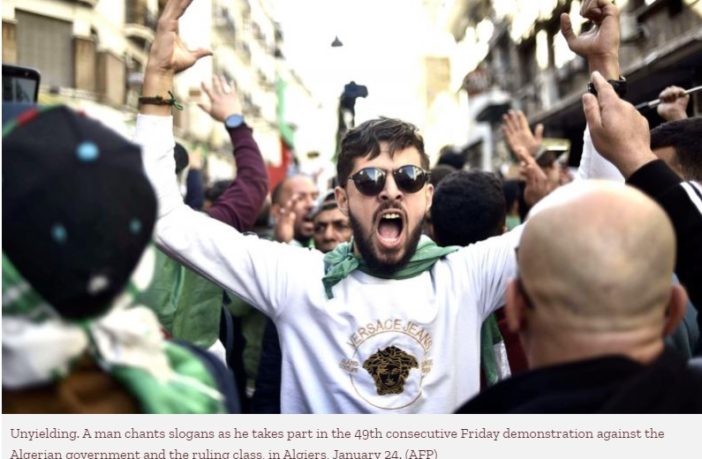The Arab Weekly
Thousands of people took to the streets across Algeria for a 49th consecutive week of protests, showing a determination to pursue a pro-democracy movement, although there was a noted decline in the number of demonstrators.
The issue of shale gas made its debut in the protests January 24. “Makanch sakhri, qoulou Li França dirou fi Paris” (“There is no tapping of shale gas; tell France to do it in Paris”), protesters chanted in reaction to the government’s insistence that Algeria needs to exploit shale gas to expand exports and bolster foreign currency earnings.
However, political change was still a prime topic. “La hiwar, la hadra, el raiss Iheb Ibia Essahara” (“No dialogue, no talks, the president wants to sell the Sahara Desert”),” protesters cried.
“Ya intoumaa Ya Ihnaa. Manach Habsine” (“Either you or us. We will not stop),” shouted some protesters.
Algerian President Abdelmadjid Tebboune, elected December 12, offered protesters dialogue to build a consensus over broad reforms.
The protests erupted February 22, 2019, against long-time President Abdelaziz Bouteflika’s intent to extend his stay in power of 20 years by seeking new 5-year term. However, Bouteflika was ousted in April and dozens of his loyalists were jailed.
The protesters pressed with demands that the military-dominated regime be overhauled but their numbers have fallen across the country.
In Algiers, police dispersed small crowds and allowed larger ones. In the western cities of Sidi Bel Abbes and Tlemcen, police have blocked protests since early December, causing activists to travel to the nearby town of Oran, where demonstrations took place.
The protests have turned into a weekly “dialogue” between the Algerians in the streets and the new president.
Tebboune, in his first news conference January 22, said: “I commit myself to satisfying all the demands of the blessed Hirak (pro-democracy movement), including amending the constitution and changing the laws as part of the radical change of the foundations of our democracy in Algeria to establish a genuine democracy.”
“The fight against exclusion in all its forms, against corruption and for moralising public life is part of the demands and I take them into account and I will continue to do so,” he added.
Tebboune has met with several political figures and personalities, some of them active in the Hirak.
“What has mattered for me and what is mattering in meeting the personalities is their influence in society and public opinion. All these personalities underlined the need for measures of appeasement,” he said.
More than 90 activists jailed for their role in the Hirak have been released in recent weeks but 124 others remained in detention, including leading figures of the protests.
Turning to the shale gas issue, Tebboune said: “We are a gas-producing state rather than an oil producer. Our country is the second or third country in the world with the largest shale gas reserves. We export no agricultural products or manufacturing goods.
“I do not understand why some people oppose tapping shale gas while they advocate for borrowing money from abroad. Why?”
Tebboune’s call for talks about reforms caused division among political elites. Some argued that talks with the president are the only way towards change while others refused his “extended hand” on the assumptions that only the mass protests would force the “regime to dismantle itself.”
However, many spoke of the apparent stalemate of the Hirak.
Algerian writer Kamel Daoud jolted pro-democracy activists when he concluded in an essay in the French newspaper Le Point that the “Hirak is a lost revolution” and Algeria finds itself between “a temporary failure of the Hirak” and a “temporary victory of the regime.”
His words fired a spirited debate among writers and intellectuals, some of whom slammed Daoud as suffering the “colonised complex,” looking at the multifaceted realities of Algerian society through the lens of right-wing leaning intellectuals in France, who see crises in former colonies as justification for past colonisation.
“By stating that the Hirak has failed and the regime has carried the day against mass protests, Kamel Daoud legitimises in advance the crackdown threatening to hit the movement,” said sociologist Lahouari Addi, a staunch supporter of the protests.
Others said Daoud “awakened the dead” by saying the protests remained an “urban phenomenon” with the leadership centralised in Algiers.
“The activists of the Hirak failed to understand that the urban strength is a political ghetto,” he argued. “The regime regains control in the hinterland and has offered a formula more readable by the rural population: election, stability and protection against foreign plots.”
“The activists failed to move from radical slogans of change — ‘Go away, all of you’ — to a negotiating posture with the regime, which still holds essential levers of power: oil revenues, repression forces and international support of foreign partner states,” he added.
Algerian writer Youcef Benzatat said Daoud’s and others’ similar views were spread by foreign media “involved in an international conspiracy against the peoples.”
“Indeed, Kamel Daoud was selected by these media as the ideal Algerian to carry out such perilous mission with the aim of negatively influencing the debate of the Hirak activists,” Benzatat said.

Written ByAW staff







